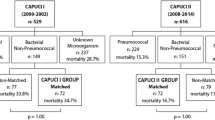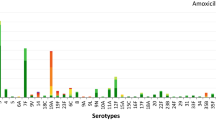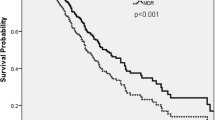Abstract
Objective
This study was conducted to identify risk factors for mortality and to evaluate the impact of antimicrobial resistance on outcome in adult patients with invasive pneumococcal disease (IPD).
Methods
A post hoc analysis of an observational cohort study on community-acquired pneumococcal infections was conducted and a total of 136 adult patients with IPD were analyzed in this study.
Results
Pneumonia was the most common type of infection (n = 84, 61.8 %), followed by primary bacteremia (n = 15, 11.0 %) and meningitis (n = 15, 11.0 %). One hundred and three patients (75.7 %) had concomitant pneumococcal bacteremia. The overall 30-day mortality rate was 26.5 % (36/136), and factors associated with 30-day mortality were corticosteroid use, presentation with septic shock, and development of acute respiratory distress syndrome (ARDS) (all P < 0.05). While penicillin and erythromycin resistance were associated with a lower mortality, an association between levofloxacin resistance and increased mortality was found in the univariate analysis; however, statistical significance was not reached (P = 0.083). Multivariable analysis showed that presentation with septic shock, corticosteroid use, development of ARDS, and levofloxacin resistance were independent factors associated with 30-day mortality. Of the five patients with IPD caused by levofloxacin-resistant Streptococcus pneumoniae, three (60 %) died within 30 days of diagnosis.
Conclusion
Levofloxacin resistance was associated with increased mortality, along with septic shock, prior use of corticosteroids, and development of ARDS, in adult patients with IPD. Our data suggest that the emergence of levofloxacin resistance among invasive pneumococcal isolates is now becoming a challenge for clinicians managing community-acquired bacterial infections.
Similar content being viewed by others
References
Doshi SM, Rueda AM, Corrales-Medina VF, Musher DM. Anemia and community-acquired pneumococcal pneumonia. Infection. 2011;39:379–83.
Giner AM, Kuster SP, Zbinden R, Ruef C, Ledergerber B, Weber R. Initial management of and outcome in patients with pneumococcal bacteremia: a retrospective study at a Swiss university hospital, 2003–2009. Infection. 2011;39:519–26.
Choi WS, Noh JY, Huh JY, Youn YK, Kim MJ, Jo YM, Kim JY, Song JY, Park DW, Kim WJ, Kim MJ, Cheong HJ. Clinical features of invasive pneumococcal disease in Korea. Infect Chemother. 2010;42:156–61.
Yu VL, Chiou CC, Feldman C, Ortqvist A, Rello J, Morris AJ, Baddour LM, Luna CM, Snydman DR, Ip M, Ko WC, Chedid MB, Andremont A, Klugman KP; International Pneumococcal Study Group. An international prospective study of pneumococcal bacteremia: correlation with in vitro resistance, antibiotics administered, and clinical outcome. Clin Infect Dis. 2003;37:230–7.
Song JH, Jung SI, Ki HK, Shin MH, Ko KS, Son JS, Chang HH, Kim SW, Lee H, Kim YS, Oh WS, Peck KR, Chongthaleong A, Lalitha MK, Perera J, Yee TT, Jamal F, Kamarulzaman A, Carlos CC, So T; Asian Network for Surveillance of Resistant Pathogens Study Group. Clinical outcomes of pneumococcal pneumonia caused by antibiotic-resistant strains in Asian countries: a study by the Asian Network for Surveillance of Resistant Pathogens. Clin Infect Dis. 2004;38:1570–8.
Low DE. Quinolone resistance among pneumococci: therapeutic and diagnostic implications. Clin Infect Dis. 2004;38:S357–62.
Wolter N, du Plessis M, von Gottberg A, de Gouveia L, Klugman KP. Molecular characterization of emerging non-levofloxacin-susceptible pneumococci isolated from children in South Africa. J Clin Microbiol. 2009;47:1319–24.
Pletz MW, McGee L, Jorgensen J, Beall B, Facklam RR, Whitney CG, Klugman KP. Levofloxacin-resistant invasive Streptococcus pneumoniae in the United States: evidence for clonal spread and the impact of conjugate pneumococcal vaccine. Antimicrob Agents Chemother. 2004;48:3491–7.
Orr D, Wilkinson P, Moyce L, Martin S, George R, Pichon B. Incidence and epidemiology of levofloxacin resistance in Streptococcus pneumoniae: experience from a tertiary referral hospital in England. J Antimicrob Chemother. 2010;65:449–52.
McGee L, Goldsmith CE, Klugman KP. Fluoroquinolone resistance among clinical isolates of Streptococcus pneumoniae belonging to international multiresistant clones. J Antimicrob Chemother. 2002;49:173–6.
de Cueto M, Rodríguez JM, Soriano MJ, López-Cerero L, Venero J, Pascual A. Fatal levofloxacin failure in treatment of a bacteremic patient infected with Streptococcus pneumoniae with a preexisting parC mutation. J Clin Microbiol. 2008;46:1558–60.
Rodríguez-Avial I, Ramos B, Ríos E, Cercenado E, Ordobás M, Sanz JC; Madrid Streptococcus pneumoniae Microbiological Group. Clonal spread of levofloxacin-resistant Streptococcus pneumoniae invasive isolates in Madrid, Spain, 2007 to 2009. Antimicrob Agents Chemother. 2011;55:2469–71.
Dalhoff A. Resistance surveillance studies: a multifaceted problem-the fluoroquinolone example. Infection. 2012;40:239–62.
Kim SH, Song JH, Chung DR, Thamlikitkul V, Yang Y, Wang H, Lu M, So TM, Hsueh PR, Yasin RM, Carlos CC, Pham HV, Lalitha MK, Shimono N, Perera J, Shibl AM, Baek JY, Kang CI, Ko KS, Peck KR; ANSORP Study Group. Changing trends in antimicrobial resistance and serotypes of Streptococcus pneumoniae isolates in Asian Countries: an Asian Network for Surveillance of Resistant Pathogens (ANSORP) study. Antimicrob Agents Chemother. 2012;56:1418–26.
Marrie TJ, Tyrrell GJ, Garg S, Vanderkooi OG. Factors predicting mortality in invasive pneumococcal disease in adults in Alberta. Medicine (Baltimore). 2011;90:171–9.
Friedman ND, Kaye KS, Stout JE, McGarry SA, Trivette SL, Briggs JP, Lamm W, Clark C, MacFarquhar J, Walton AL, Reller LB, Sexton DJ. Health care-associated bloodstream infections in adults: a reason to change the accepted definition of community-acquired infections. Ann Intern Med. 2002;137:791–7.
Davidson R, Cavalcanti R, Brunton JL, Bast DJ, de Azavedo JC, Kibsey P, Fleming C, Low DE. Resistance to levofloxacin and failure of treatment of pneumococcal pneumonia. N Engl J Med. 2002;346:747–50.
Anderson KB, Tan JS, File TM Jr, DiPersio JR, Willey BM, Low DE. Emergence of levofloxacin-resistant pneumococci in immunocompromised adults after therapy for community-acquired pneumonia. Clin Infect Dis. 2003;37:376–81.
Ho PL, Tse WS, Tsang KW, Kwok TK, Ng TK, Cheng VC, Chan RM. Risk factors for acquisition of levofloxacin-resistant Streptococcus pneumoniae: a case–control study. Clin Infect Dis. 2001;32:701–7.
Klugman KP. The successful clone: the vector of dissemination of resistance in Streptococcus pneumoniae. J Antimicrob Chemother. 2002;50:1–5.
Eliopoulos GM. Quinolone resistance mechanisms in pneumococci. Clin Infect Dis. 2004;38:S350–6.
Alanee SR, McGee L, Jackson D, Chiou CC, Feldman C, Morris AJ, Ortqvist A, Rello J, Luna CM, Baddour LM, Ip M, Yu VL, Klugman KP; International Pneumococcal Study Group. Association of serotypes of Streptococcus pneumoniae with disease severity and outcome in adults: an international study. Clin Infect Dis. 2007;45:46–51.
Acknowledgments
We would like to thank all of the ANSORP study group investigators who participated in this study for their dedication and contribution. Wyeth Pharmaceuticals Inc. (currently, Pfizer Inc.) [0877X1-4448] and the Asia Pacific Foundation for Infectious Diseases (APFID), Seoul, Korea, supported this work. This study was also supported by a grant from the Korea Healthcare Technology R&D Project, Ministry for Health and Welfare, Republic of Korea (A102065).
Conflict of interest
All authors have no conflicts of interest to declare.
Author information
Authors and Affiliations
Consortia
Corresponding author
Additional information
The Asian Network for Surveillance of Resistant Pathogens (ANSORP) study group is given in the “Appendix”.
Appendix: Asian Network for Surveillance of Resistant Pathogens (ANSORP) study group
Appendix: Asian Network for Surveillance of Resistant Pathogens (ANSORP) study group
Hospitals and investigators participating in the ANSORP study group are as follows: Jae-Hoon Song (Organizer), Doo Ryeon Chung, Kyong Ran Peck, and Cheol-In Kang (Samsung Medical Center, Seoul), Joon-Sup Yeom (Kangbuk Samsung Hospital, Seoul), Hyun Kyun Ki (Konkuk University Hospital, Seoul), Jun Seong Son (Kyunghee University Hospital, Seoul), Yeon-Sook Kim (Chungnam National University Hospital, Daejeon), Ji-Young Rhee (Dankook University Hospital, Cheonan), Sook-In Jung and Kyung Hwa Park (Chonnam National University Hospital, Gwangju), Shin-Woo Kim and Hyun-Ha Chang (Kyungpook National University Hospital, Daegu), Ki Tae Kwon (Daegu Fatima Hospital, Daegu), Hyuck Lee (Dong-A University Hospital, Busan), Chisook Moon (Inje University Busan Paik Hospital, Busan), Sang Yop Shin (Cheju National University Hospital, Jeju), and Sang Taek Heo (Gyeongsang National University Hospital, Jinju; currently Cheju National University Hospital, Jeju) in Korea; Hui Wang (Peking Union Medical College Hospital, Beijing; currently Peking University People’s Hospital, Beijing), Bin Cao and Yingmei Liu (Beijing Chaoyang Hospital, Beijing), Yunjian Hu and Tieyiing Sun (Beijing Hospital, Beijing), Chao Zhuo and Danhong Su (Guangzhou Institute of Respiratory Diseases, Guangzhou), Yunsong Yu and Yang Qing (First Affiliated Hospital of College of Medicine, Zhejiang University, Hangzhou), Rong Zhang (Second Affiliated Hospital of College of Medicine, Zhejiang University, Hangzhou), Ziyong Sun and Shengdao Xiong (Tongji Hospital of Tongji Medical College, Huazhong University of Sciences and Technology, Wuhan), Yong Liu (Shengjing Hospital of China Medical University, Shenyang), Yunzhou Chu, Baiyi Chen, and Xiaochun Ma (The First Hospital China Medical University, Shenyang), Yonghong Yang, Xuzhuang Shen, Sangjie Yu, Kaihu Yao, and Yinghui Hu (Beijing Children’s Hospital Affiliated to Capital Medical University, Beijing), Libo Wang and Chuangqing Wang (Pediatric Hospital of Fudan University, Shanghai), Yuan Chen, Ying Huang and Lan Liu (Chongquing Children’s Hospital, Chongquing), Yuejie Zheng (Shenzhen Children’s Hospital, Shenzhen), and Min Lu, Hong Zhang, and Quan Lu (Shanghai Children’s Hospital, JiaoTong University) in China; Thomas M. K. So and Tak Keung Ng (Princess Margaret Hospital) and Wai-Keung Kwan and Wing-kin To (Yan Chai Hospital) in Hong Kong; Po-Ren Hsueh (National Taiwan University Hospital, Taipei), Cheng-Hsun Chiu and Lin-Hui Su (Chang-Gung Children’s Hospital, Taoyuan), and Yen-Hsu Chen (Chung-ho Memorial Hospital, Kaohsiung) in Taiwan; Visanu Thamlikitkul (Siriraj Hospital, Bangkok) and Anan Chongthaleong (Chulalongkorn University Hospital, Bangkok) in Thailand; Rohani Md Yasin and Norazah Ahmad (Institute for Medical Research, Kuala Lumpur), Adeeba Kamarulzaman, Sasheela Vanar, and Rina Karunakaran (University Malaya Medical Centre, Kuala Lumpur), Dato’ Jeyaindran Sinnadurai, Shanti Rudra Deva, and Mohamad Nazri Aziz (Hospital Kuala Lumpur, Kuala Lumpur), Tan Kah Kee, Suhailah Md Hanapiah, Jaideep Singh Sidhu, and Jenny Tong May Geok (Hospital Seremban, Seremban), Mahiran Mustafa, Nurahan Binti Maning, and Shaiful Azman Zakaria (Hospital Kota Bharu, Kelantan), Christopher Lee, Anuradha a/p, Radhakrishnan, Shanti a/p Ratnam, Zubaidah Abdul Wahab, and Ariza Adnan (Hospital Sungai Buloh, Sungai Buloh, Selangor), Lily Ng, Timothy William, Kausalia a/p Chinnaiah, and Azura Hussin (Hospital Queen Elizabeth, Pulau Pinang), Ganeswrie Balan, Subramaniam Balan, Chua Hoch Hin, Tan Cheng Cheng, and Kan Foong Kee (Hospital Sultanah Aminah, Johor Bahru), Salbiah Hj Nawi, Loh Eng Chang, and Tang Swee Ping (Hospital Salayang, Kuala Lumpur), and Ahmad Kashfi Abd Rahman, Siow Yen Ching, Mohd Ridwan mohd, Noor, Jimmy Lee Kok Foo, Fatimah Haslina Abdullah, and Noraznita Safie (Hospital Tuanku Nur Zahira, Kuala Terengganu) in Malaysia; Celia Carlos (Research Institute for Tropical Medicine, Manila), Sullian Naval (The Lung Center of the Philippines, Quezon), Media dora Saniel (The Medical City, Pasig), Joanne Lobo (Davao Medical Center, Davao), Consuelo Malaga (Vicente Sotto Memorial Hospital), and Thea Pamela Cajulao and Xenia Fabay (Baguio General Hospital and Medical Center, Baguio City) in the Philippines; Pham Hung Van and Pham Thai Binh (University of Medicine and Pharmacy, Ho Chi Minh), Tran Van Ngoc and Tran Thi Thanh Nga (Cho Ray Hospital, Ho Chi Minh), Le Tien Dung (Nguyen Tri Phuong Hospital, Ho Chi Minh), Doan Mai Phuong (Bach Mai Hospital, Ha Noi), Tung Vu Nguyen (National Institute of Tropical Diseases, Ha Noi), Huyen Dieu Thi Phan (Hospital C in Da Nang, Da Nang), and Chau Vinh (Tropical Diseases Hospital, Ho Chi Minh) in Vietnam; M. K. Lalitha (Madras Medical Mission, Chennai), Saradha Suresh (Institute of Child Health, Chennai), and Ranganathan Iyer (Global Hospital, Hyderabad) in India; Nobuyuki Shimono and Yujiro Uchida (Kyushu University Hospital, Fukuoka) in Japan; Jennifer Perera (University of Colombo, Colombo) in Sri Lanka; and Atef M. Shibl (King Saud University Hospital, Riyadh) in Saudi Arabia.
Rights and permissions
About this article
Cite this article
Kang, CI., Song, JH., Kim, S.H. et al. Association of levofloxacin resistance with mortality in adult patients with invasive pneumococcal diseases: a post hoc analysis of a prospective cohort. Infection 41, 151–157 (2013). https://doi.org/10.1007/s15010-012-0299-5
Received:
Accepted:
Published:
Issue Date:
DOI: https://doi.org/10.1007/s15010-012-0299-5




